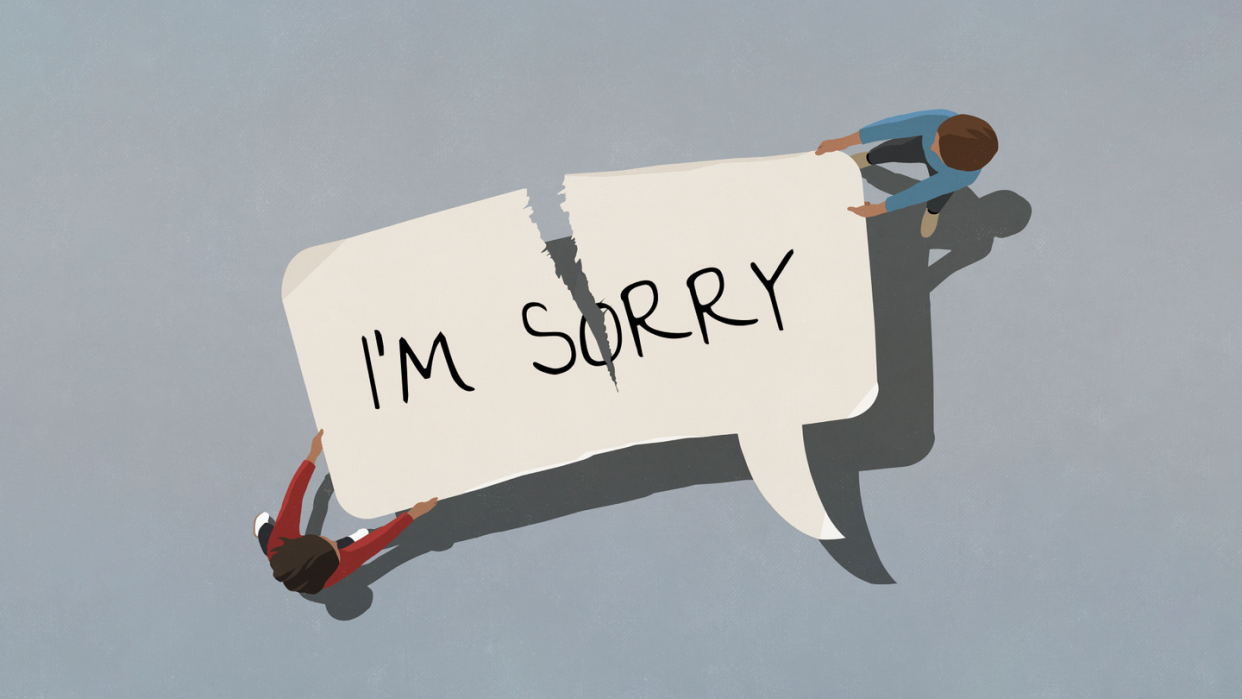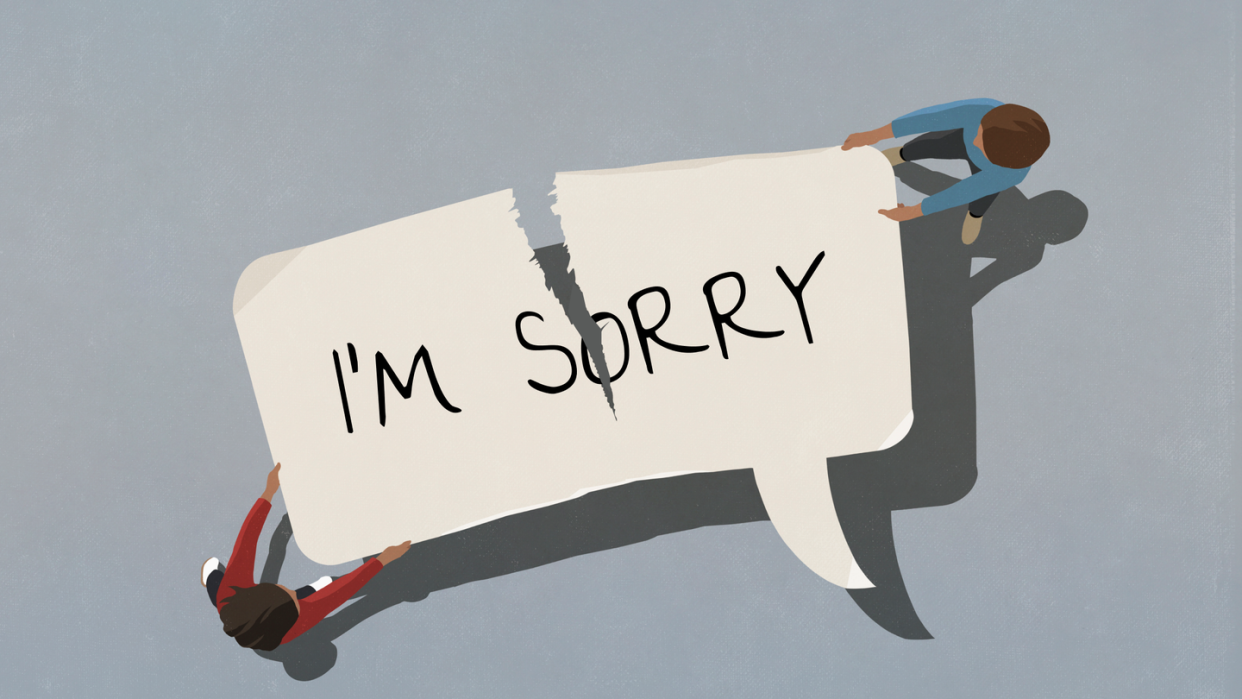What to Say When Someone You Love Is Hurting


Bereavement, illness, divorce, job loss. Anyone who has lived to middle age has taken more than a few hits. And yet, when someone close to us is suffering mightily and we want to express love and support, we often find ourselves tongue-tied or defaulting to a generic “I’m so sorry.”
Grief specialist David Kessler, author of Finding Meaning: The Sixth Stage of Grief, is a counselor who has worked with the LAPD and the Red Cross in trauma situations. On his website, Grief.com, “the most visited page is the ‘Best and Worst Things to Say’ to people in grief, and it is most visited in the middle of the night,” he says. “This tells me that people are up, trying to figure out the right words.”
That uncertainty comes from a place of fear but also compassion—we want to say something meaningful, but we don’t want to add to a person’s pain. How to thread that needle? Here’s what a few experts suggest.
First and foremost, don’t avoid the issue
The worst thing we can say when someone is hurting may be nothing at all. Tanmeet Sethi, MD, a Sikh American integrative and psychedelic medicine physician, activist, and author of the book Joy Is My Justice, felt this firsthand when her then-3-year-old son was diagnosed with Duchenne muscular dystrophy, a debilitating terminal illness. She was confused, and hurt, when her loving parents regularly asked her husband how she was doing rather than asking her directly. When she questioned them, they explained, “If you’re feeling bad, we don’t want to make it worse, and if you’re feeling good, we don’t want to bring you down.”
While Sethi understands the impulse, she pointed out to them that her grief is always there, even if it’s alongside happiness. “There are nights I don’t want to talk about it; I just want to have a drink,” she says. “But I never, never don’t appreciate it when someone asks how I’m doing. I have never felt like, ‘Oh, God, why’d you bring that up? I’d forgotten about it.’”
In other words, saying something is always better than saying nothing. “The truth is, there are no magic words to fix a divorce, or a loss,” says Kessler. “People really want to know that they’re seen. It’s completely okay to say, ‘Oh, my gosh. I don’t know the right words to say, but I’m here and I love you.’”
Also, think about how you normally communicate with the person and take it up a notch, says Kessler. “If you usually message on social media but you have their number, text. If it’s usually a text, call. This is probably one of the biggest things they’re going through in their life. It’s a moment for us to show up a little bigger, too.”
Don’t “bright side” the situation, either
That’s what Kessler calls it when we insist on shoving a silver lining in a hurting person’s face. “There is a time to cheer people up, but it’s when they’re ready, not when they’re in pain,” he says. Another pointer: “Don’t begin sentences with ‘At least,’ which is minimizing and dismissive: ‘At least you don’t have to put up with your husband snoring anymore,’ if they’re divorcing. Or ‘At least now you can go get a job you like!’”
Etiquette expert Lisa Grotts advises against statements that try to turn a loss into a blessing, such as “It was their time to go” or “They’re in a better place” or “God doesn’t give us more than we can handle.” These pat answers “lack support, compassion, and empathy. Your job is to offer comfort,” says Grotts, not to magic away someone’s sadness.
Ask about their experience and offer tangible support
“When people say, ‘I can’t imagine what you’re going through,’” says Kessler, “I always answer, ‘You don’t have to. I’m going through it, so just ask me questions.’”
The key is to ask broad questions that don’t assume that their grief will mirror yours or anyone else’s. An open-ended “How are you feeling?” is always a safe bet. As you listen to the answer, use your imagination to answer the question “What can I do for you?” This takes the onus off the bereaved person having to stage-manage your support. “If she goes, ‘Oh my gosh. I’m struggling to keep up with the kids,’ hear that and say, ‘You know what? I could take the kids to soccer for you. I could drop over dinner so it’s ready for you when you get home,’” says Kessler.
Another helpful gesture: Let your loved one know that your offer has no expiration date. “In moments or challenge, no one knows what they need,” points out Sethi. “Swoop in and say, ‘I'm available to get groceries on these days. Would any of that be helpful? If you don’t know now, here’s my number, and remember that you can text or call me.’”
When you go blank, just be honest
If you are unsure of what to say, says Sethi, “own the moment authentically instead of trying to make some trite or wrapped-up statement. Start with ‘I’m listening, and I love you’ or ‘I don’t know what to say, but I want to be here in any way I can.’”
Kessler’s go-to is similar: “I don’t know the right thing to say, but I’m here and I love you.”
After that, let the conversation chart its own course. As it does, Grotts suggests keeping in mind the three S’s: sensitivity, support, and space. Through your actions and words, “you're essentially saying, ‘I hear you,’” she says.
Continue to check in for weeks, months, even years
Grief isn’t linear. It’s cyclical. And it never really goes away. So when a loved one suffers a traumatic event, continue to check in, listen, and support, suggests Kessler. “I always use the rule of three: I call at three days. I call at three weeks. I call at three months.”
Over time, that person’s needs will change. When you check in, “ask how they’re feeling, and validate their feelings, because everyone is different,” says Grotts, who lost her niece two years ago. Six months ago, her sister informed her that she didn’t want to discuss the loss anymore, with anyone. “We’re having to change with it,” says Grotts. “It’s hard, but we’re giving her space and pace.”
It’s also thoughtful to check in on milestones of a major loss. You might not want to upset someone by reminding them of, say, the anniversary of their mother’s death. But guess what? “No one forgets a death,” Kessler says. “It’s so helpful to say, ‘I know how painful your mother’s death has been. The anniversary is coming up, and I just want you to know I’m here.’”
Occasionally, Kessler says, someone will come to him and say that they checked in with a grieving friend, and, to their horror, “I made them cry.” To that, Kessler responds, “You didn’t make them cry. You made yourself a safe person to cry with.”
You Might Also Like
